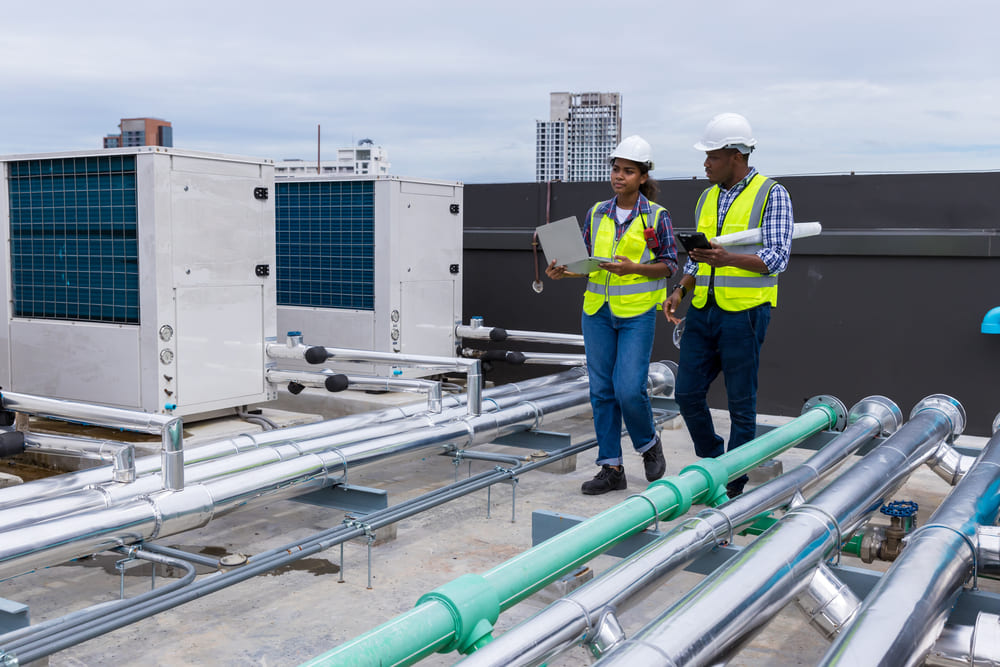Low-Energy HVAC Systems Installation for Green Home Comfort
Discover Comprehensive HVAC Solutions for All Your Home Heating and Air Conditioning Requirements
On the planet of home convenience, the option of an ideal HVAC system plays a crucial duty. Whether it's the blistering heat of summer or the biting cold of wintertime, a reliable heating and cooling solution makes certain a well balanced indoor climate. House owners have to browse a variety of choices, from energy-efficient designs to sophisticated geothermal options. Understanding these options not just improves convenience yet likewise maximizes power usage. Additional expedition of these systems reveals the detailed balance between price and capability.
Recognizing Different Sorts Of A/c Equipments
heating and cooling systems, essential for managing indoor climate, differ widely to suit various settings and building needs. Central systems, one of the most usual kinds, use a network of ducts to distribute conditioned air throughout a structure. These systems typically consist of components like heaters, ac system, or heat pumps. In comparison, ductless systems, such as split, multi-split, or mini-split systems, provide straight a/c and home heating to certain areas without the need for ductwork, providing more localized control and potentially lowering power losses connected with ducting. An additional choice is the increasingly preferred geothermal heatpump system, which makes use of underground temperature levels to provide cooling and heating, using a green alternative that can dramatically lower power use in time.
Choosing the Right A/c System for Your Home
Choosing the appropriate cooling and heating system for your home includes cautious factor to consider of a number of variables. Home dimension dramatically affects the system's ability required to successfully heat and cool the room. In addition, the environment in which one lives determines whether to focus on home heating effectiveness, cooling power, or an equilibrium of both. Power performance rankings, such as SEER (Seasonal Energy Effectiveness Proportion) for cooling down and AFUE (Annual Gas Use Efficiency) for home heating systems, are crucial in picking an economical system that straightens with environmental and monetary objectives. Ultimately, the kind of system-- whether a split system, hybrid, or ductless-- have to align with the home's architectural design and existing ductwork to make sure ideal efficiency and convenience of installation.

The Significance of Routine A/c Maintenance
After selecting the ideal heating and cooling system, preserving its efficiency and durability ends up being the following action. Regular heating and cooling upkeep is vital for making sure that home heating and air conditioning systems operate at peak performance. This proactive strategy not only assists in reducing power consumption yet also prolongs the lifespan of the devices. Technicians performing normal checks can determine and remedy small concerns prior to they intensify into major issues, consequently avoiding costly repairs and unexpected breakdowns - HVAC repair. In addition, upkeep makes sure that the system gives regular convenience throughout the periods. Companies and house owners alike find that arranged maintenance keeps the system's integrity and safety, eventually leading to improved air quality and a reduction in total operational costs. Regular upkeep is an important component of possessing an a/c system.
Usual HVAC Troubles and How to Address Them
Regardless of routine maintenance, heating and cooling systems can still encounter a her comment is here range of usual issues that impact their efficiency and functionality. Dirty filters can obstruct air movement, minimizing system performance and stressing its parts. On a regular basis changing or cleaning up filters can prevent this problem. One more constant problem is thermostat malfunctions, which can create the heating and cooling system to run exceedingly or otherwise sufficient, leading to discomfort and enhanced power costs. Checking and rectifying the thermostat can solve this issue. Leakages in refrigerant lines also impact performance, calling for specialist detection and repair work. Additionally, worn parts like capacitors and follower motors might stop working, demanding timely fixings to stay clear of even more significant damages and make certain optimum performance.
Assessing the Cost-Effectiveness of HVAC Upgrades
Why should property owners take into consideration updating their a/c systems? Upgrading an a/c system can considerably lower energy intake, bring about lower utility costs and increased power effectiveness. Modern systems are created to be extra ecologically pleasant, making use of less energy to achieve the exact same degree of comfort compared to older versions. In addition, newer devices usually include innovative attributes such as programmable thermostats, which can optimize heating and cooling routines based on way of living patterns, better enhancing new heating and cooling system price savings.
When assessing the cost-effectiveness of these upgrades, it's vital to think about the first investment against lasting cost savings. Typically, the higher in advance cost can be countered by the decrease in ongoing energy costs and maintenance prices. Several neighborhood federal governments use refunds and motivations for energy-efficient home appliance purchases, making upgrades a lot more budget friendly - HVAC repair.

Verdict
To conclude, choosing the ideal a/c system and making sure normal upkeep are vital for ideal indoor comfort and air high quality. Numerous systems use customized remedies, making it vital to comprehend the details requirements based upon home dimension and neighborhood environment. Addressing common concerns quickly and thinking about energy-efficient upgrades can substantially boost system efficiency and cost-effectiveness. Eventually, professional heating and cooling services give a trustworthy pathway to accomplishing and preserving a comfortable, energy-efficient home setting.
In comparison, ductless systems, such as split, multi-split, or mini-split systems, provide straight air conditioning and home heating to specific areas without the need for ductwork, using more localized control and potentially minimizing energy losses connected with ducting. The kind of system-- whether a split system, hybrid, or ductless-- must align with the home's structural layout and existing ductwork to make sure optimal performance and convenience of installment.
